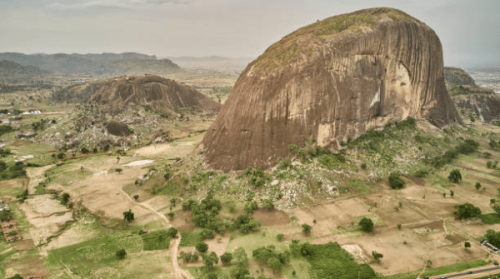September 2024 witnessed another unsettling series of earth tremors in Abuja, particularly affecting residents in Wuse and Maitama. While these tremors didn’t cause massive destruction, the panic and confusion they induced serve as a critical reminder of potential future risks. As a long-time resident of Abuja, I’ve experienced these tremors firsthand. The fear, the uncertainty, and the unanswered questions from neighbors all boil down to one thing: Are we prepared if something worse happens?
In this article, I’ll walk you through what earth tremors are, why they occur in Abuja, and what you can do to stay safe. Drawing from personal insights, expert advice, and research, this is your comprehensive guide to understanding and navigating these seismic events.
What Are Earth Tremors?
In layman’s terms, an earth tremor is a minor shaking of the ground caused by seismic activity, such as the movement of tectonic plates beneath the Earth’s surface. While tremors are typically milder than earthquakes, they can still cause anxiety and, in some cases, minor damage to structures.
Key Takeaways:
- Tremors are milder than earthquakes but can still shake buildings and cause panic.
- Abuja has experienced tremors in the past, with notable ones in 2018, 2021, and now 2024.
- The cause of tremors in Abuja is mostly natural fault line movements, but rapid urban development might contribute.
- Staying informed and prepared is crucial for mitigating risks in future events.
A Terrifying Experience for Residents
On September 14th and 15th, 2024, the rumbling was sudden. For many residents in Wuse and Maitama, what started as a normal day quickly turned into a harrowing experience. Buildings trembled, windows rattled, and the ground beneath our feet felt as though it was shifting. It wasn’t long before people rushed out of their homes, confused and frightened. As someone who has lived in Abuja for over a decade, I’ve never seen the city so shaken—literally and figuratively.
Many described hearing a low, rumbling noise, almost like a distant thunderstorm, while others reported cracks appearing on their walls. In our community group chat, everyone was asking the same question: What’s causing this?
Previous Occurrences: A History of Tremors in Abuja
Earth tremors in Abuja aren’t entirely new. In 2018, the Mpape area—located just outside the city center—experienced tremors from September 5th to 7th. These events were attributed to fault movements within the Earth’s upper crust. Another tremor in the same Mpape area occurred in 2021, raising more concerns about Abuja’s susceptibility to seismic activities.
While Nigeria isn’t located on any major earthquake fault line, it has experienced localized tremors over the years. These seismic events, though rare, highlight the importance of understanding why they happen and how to prepare for them.
Why Are Earth Tremors Happening in Abuja?
Though Nigeria is generally considered an “aseismic” zone, earthquakes can still happen. According to experts, Abuja’s tremors are likely due to natural fault lines that occasionally shift. The city’s rapid urban expansion—coupled with activities like construction, mining, and drilling—may also play a part in exacerbating the earth’s movements.
Causes of Earth Tremors in Abuja:
- Fault Movements: Natural shifts in the earth’s crust.
- Underground Water Reservoirs: Changes in water pressure deep below the surface can trigger movements.
- Human Activities: Construction, drilling, and mining may contribute to seismic instability.
Authorities’ Response and Public Safety
Immediately after the tremors, the Nigerian Geological Survey Agency (NGSA) began investigations. Their primary goal? To assess whether these tremors could lead to a larger seismic event and to monitor any further earth movements in Abuja.
Similarly, the Federal Capital Territory Administration (FCTA) reassured the public that they are working with geological experts to assess potential damage to buildings. They’ve also encouraged residents to report any cracks or structural weaknesses.
What You Can Do to Stay Safe
While tremors can’t be predicted, there are steps you can take to protect yourself and your property in the event of another occurrence.
Top Safety Tips for Earth Tremors:
- Inspect Your Building: Regularly check for cracks or weaknesses, especially in load-bearing walls and foundations.
- Secure Heavy Objects: Ensure that heavy furniture and appliances are fastened securely to prevent them from falling.
- Create an Emergency Plan: Families and businesses should have an evacuation route and a designated safe area in case of future tremors.
- Stay Informed: Keep up with local news updates and safety guidelines from authorities.
- Know Evacuation Routes: Identify safe exit points in your home or workplace in case you need to evacuate quickly.
FAQs: Earth Tremors in Abuja
1. What is an earth tremor?
An earth tremor is a minor shaking or vibration of the ground due to seismic activity. It is less intense than an earthquake.
2. How is an earth tremor different from an earthquake?
The difference lies in intensity. Earthquakes are more intense and cause significant damage, while tremors are usually mild.
3. When was the most recent earth tremor in Abuja?
The most recent tremor occurred on September 14th and 15th, 2024, in the Wuse and Maitama areas.
4. Has Abuja experienced earth tremors before?
Yes, notable tremors occurred in the Mpape area in 2018 and 2021.
5. What causes tremors in Abuja?
Tremors are caused primarily by natural fault movements but can also be triggered by human activities such as construction.
6. Are earth tremors common in Nigeria?
Though rare, earthquakes have been recorded in regions like Abuja, Kaduna, Ogun, Bayelsa, and Oyo.
7. Can tremors be predicted?
While predicting earthquakes with precision is difficult, monitoring seismic activity helps in assessing potential risks.
8. What should I do during a tremor?
Stay calm, take cover under sturdy furniture or an interior wall, and avoid windows. If outdoors, move to an open space away from buildings.
9. Can tremors cause significant damage?
While tremors are less destructive than earthquakes, they can still cause damage, especially to poorly constructed buildings.
10. How can the impact of tremors be mitigated?
Constructing buildings with seismic-resistant designs and having emergency plans in place can reduce the risk of damage.
The Future: A Call for Preparedness
The tremors of September 2024 have shown that Abuja, despite being far from major earthquake zones, is not immune to seismic activity. With experts calling for more comprehensive geological studies and urban planning strategies, it’s clear that we must take these events seriously.
Residents need to stay informed and prepared, and authorities should prioritize public awareness campaigns on earthquake safety. After all, as the saying goes, “It’s better to be safe than sorry.”
Wrap-Up
While the tremors of September 2024 were not catastrophic, they’ve certainly served as a wake-up call for residents and city planners alike. Preparedness is key, and as someone who experienced it firsthand, I encourage everyone in Abuja to take the necessary precautions. The earth may shake again—but with the right measures in place, we can stay safe.
Sources:
Connect with me on social media:
Twitter: @WakaAbuja | Instagram: @AbujaTremors


